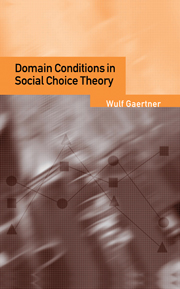Book contents
- Frontmatter
- Contents
- Preface and acknowledgements
- 1 Introduction
- 2 Notation, definitions and two fundamental theorems
- 3 The existence of collective choice rules under exclusion conditions for finite sets of discrete alternatives
- 4 Arrovian social welfare functions, nonmanipulable voting procedures and stable group decision functions
- 5 Restrictions on the distribution of individuals' preferences
- 6 The existence of social choice rules in n-dimensional continuous space
- 7 Concluding remarks
- References
- Author index
- Subject index
7 - Concluding remarks
Published online by Cambridge University Press: 02 December 2009
- Frontmatter
- Contents
- Preface and acknowledgements
- 1 Introduction
- 2 Notation, definitions and two fundamental theorems
- 3 The existence of collective choice rules under exclusion conditions for finite sets of discrete alternatives
- 4 Arrovian social welfare functions, nonmanipulable voting procedures and stable group decision functions
- 5 Restrictions on the distribution of individuals' preferences
- 6 The existence of social choice rules in n-dimensional continuous space
- 7 Concluding remarks
- References
- Author index
- Subject index
Summary
After the collapse of socially planned economies, the market is the predominant mechanism. But even in most of the market-oriented economies, many dimensions of resource allocation, as Heal (1997, p. 156) notes, ‘are within the domain of political decision-making, and are therefore determined by social choices’. Heal mentions defence, education, the health care sector and investments in infrastructure. These sectors, taken together, account for a large portion of GNP in most industrialized countries. So social choices and public decision-making are an integral part of modern industrial economies and their functionings.
This monograph has been about domain restrictions in social choice theory. Do such restrictions actually exist or are they nothing else but the outgrowth of the scientist's imagination or phantasy? This question may sound purely rhetorical after many pages full of logical analysis around the issue of whether conditions on individual preferences exist that guarantee the existence of a social welfare function or a social decision rule or a continuous aggregation function.
In the section on the likelihood of cyclical majorities we cited Sen (1970, p. 164) who remarked that ‘the equiprobability assumption (of individual orderings) is a very special one, and seems to involve a denial of society, in a significant sense’ (emphasis in the original). And he continued that owing to people's values and group interests there would be ‘a fair amount of link-up’ among individuals' preferences.
- Type
- Chapter
- Information
- Domain Conditions in Social Choice Theory , pp. 125 - 130Publisher: Cambridge University PressPrint publication year: 2001



